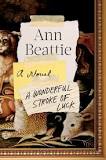Nicholas Dames at Public Books:
 No word haunts discussions of Ann Beattie like the word generation. Once upon a time, back when novelists still had the luxury of holding their publicity at a skeptical distance—let’s call it the 1980s—the word came with a prepackaged irony: to be the “voice of a generation” sounded as uncool and pathos-drenched as to be a “talk show legend” or “star of stage and screen.” But that was what she was called, from 1976, with the publication of her first novel, Chilly Scenes of Winter, and story collection, Distortions. Her much-discussed sharp, flat style—banalities rubbed so hard that they reflected—was immediately identified as the prose equivalent of a post-OPEC-embargo, post-Watergate cohort. Beattie, of course, denied that she was her generation’s voice. After all, who would want to be such a thing—and of such a cohort? Yet, the term would be ritually reapplied with each new book. This is, you could say, because the entanglement of disavowal and dependence was one of her generation’s defining dances.
No word haunts discussions of Ann Beattie like the word generation. Once upon a time, back when novelists still had the luxury of holding their publicity at a skeptical distance—let’s call it the 1980s—the word came with a prepackaged irony: to be the “voice of a generation” sounded as uncool and pathos-drenched as to be a “talk show legend” or “star of stage and screen.” But that was what she was called, from 1976, with the publication of her first novel, Chilly Scenes of Winter, and story collection, Distortions. Her much-discussed sharp, flat style—banalities rubbed so hard that they reflected—was immediately identified as the prose equivalent of a post-OPEC-embargo, post-Watergate cohort. Beattie, of course, denied that she was her generation’s voice. After all, who would want to be such a thing—and of such a cohort? Yet, the term would be ritually reapplied with each new book. This is, you could say, because the entanglement of disavowal and dependence was one of her generation’s defining dances.
more here.
